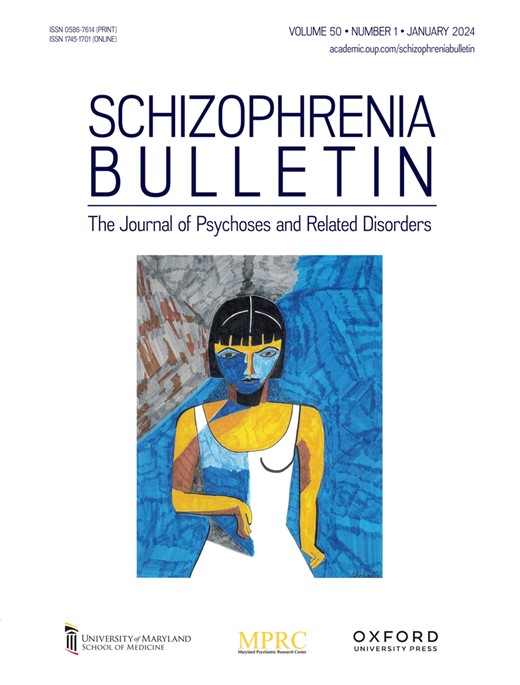Restoring Course as a Core Diagnostic Element of Psychotic Disorders
IF 5.3
1区 医学
Q1 PSYCHIATRY
引用次数: 0
Abstract
Background Foundational models of the psychoses included course as a core element differentiating patients. Current models, ICD-11 and DSM-5, only require symptom criteria to be met to make a diagnosis. We explore the proposition that making course designation essential, again, would improve the categorization of patients with psychotic disorders. Study Design We briefly discuss the history by which symptoms, alone, became the primary elements required for diagnosis. We review past and recent evidence on the best models for differentiating among psychoses. Study Results The use of course designations, along with symptoms, produces the best fit to the way in which psychotic disorders present and progress. It also matches how clinicians assess patients and choose therapeutic interventions. A model including course as a factor is more accurate and complete than models using symptoms alone. And it produces groups of patients that are likely to be more homogeneous than purely symptom-based models. The degree of heterogeneity among patients classified together within current International Classification of Diseases (ICD) and Diagnostic and Statistical Manual of Mental Disorders (DSM) categories can lead to false findings in research and a lack of clarity on the best treatment in individual cases. Increasing homogeneity in diagnostic groups, by including course designations, could advantage clinical care, clinical trials, and research on underlying pathogenic mechanisms. Conclusions Adding a course as a diagnostic element is practical. Clinicians already consider it. Specifying courses can be required in making a diagnosis. Doing so is evidence based and enhances the accuracy and value of diagnoses. We recommend restoring the course as a core element of any new diagnostic system.恢复过程作为精神障碍的核心诊断要素
背景精神病的基础模型包括病程作为区分患者的核心要素。目前的模型ICD-11和DSM-5仅要求满足症状标准即可进行诊断。我们探讨的命题,使课程指定必不可少,再一次,将改善精神病患者的分类。研究设计我们简要讨论了症状本身成为诊断所需的主要因素的历史。我们回顾了过去和最近关于区分精神病的最佳模型的证据。研究结果课程名称的使用,连同症状,产生最适合的方式,精神障碍的表现和进展。它也符合临床医生评估患者和选择治疗干预措施的方式。将病程作为一个因素的模型比仅使用症状的模型更准确和完整。它产生的患者群体可能比纯粹基于症状的模型更均匀。在目前的《国际疾病分类》(ICD)和《精神障碍诊断与统计手册》(DSM)分类中一起分类的患者之间的异质性程度可能导致研究结果错误,并且对个别病例的最佳治疗方法缺乏明确性。通过纳入病程指定,增加诊断组的同质性,可能有利于临床护理、临床试验和潜在致病机制的研究。结论增加病程作为诊断要素是可行的。临床医生已经在考虑这个问题了。在进行诊断时可能需要指定课程。这样做是基于证据的,并提高了诊断的准确性和价值。我们建议恢复课程作为任何新的诊断系统的核心要素。
本文章由计算机程序翻译,如有差异,请以英文原文为准。
求助全文
约1分钟内获得全文
求助全文
来源期刊

Schizophrenia Bulletin
医学-精神病学
CiteScore
11.40
自引率
6.10%
发文量
163
审稿时长
4-8 weeks
期刊介绍:
Schizophrenia Bulletin seeks to review recent developments and empirically based hypotheses regarding the etiology and treatment of schizophrenia. We view the field as broad and deep, and will publish new knowledge ranging from the molecular basis to social and cultural factors. We will give new emphasis to translational reports which simultaneously highlight basic neurobiological mechanisms and clinical manifestations. Some of the Bulletin content is invited as special features or manuscripts organized as a theme by special guest editors. Most pages of the Bulletin are devoted to unsolicited manuscripts of high quality that report original data or where we can provide a special venue for a major study or workshop report. Supplement issues are sometimes provided for manuscripts reporting from a recent conference.
 求助内容:
求助内容: 应助结果提醒方式:
应助结果提醒方式:


